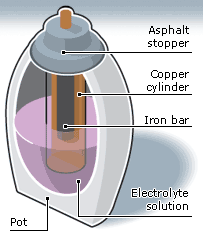About a dozen of ancient functional electric batteries capable of producing nearly a volt of power each, were found in Iraq in 1938 and have been tested in modern times. Dated to 200 BC, the so called ‘Baghdad Battery’ consists of a 5-inch clay jar, and a copper tube wrapped around an iron rod placed inside. Acidic residue was found at the bottom of the pot, and an asphalt stopper sealed the top.

They worked similar to the way that modern batteries do. An acidic liquid placed at the bottom transfers electrons from one metal to another, creating voltage at the “terminal” poking through the asphalt plug. Numerous replications have been built and successfully tested, using lemon juice, vinegar or grape juice as the electrolytic fluid.

You can find out more in the article by BBC News: “Riddle of ‘Baghdad’s Batteries.'”